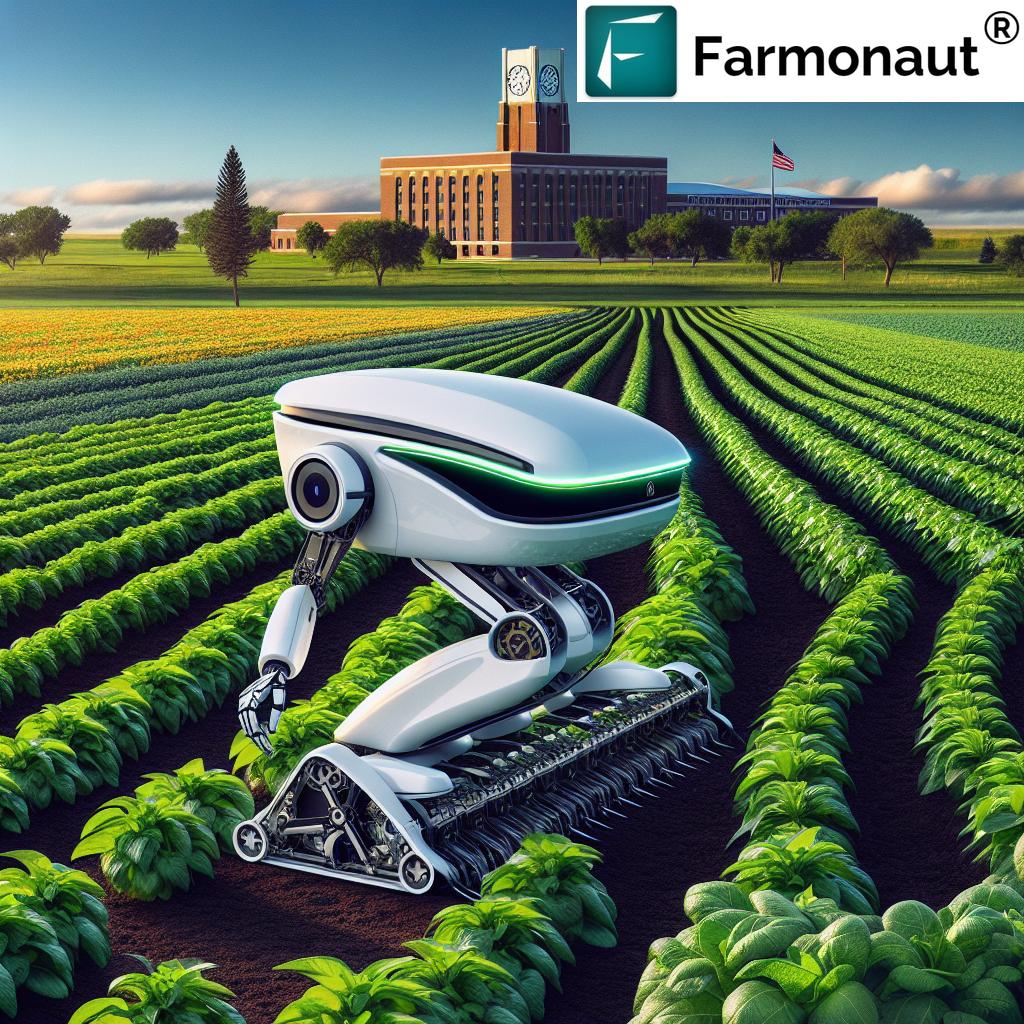Revolutionizing Farming: NDSU Students’ Innovative Weed Control Robot Takes on Global Agriculture Challenge
“NDSU students’ weed control robot project involves collaboration across multiple academic levels, including doctoral candidates.”
In the heart of North Dakota’s agricultural landscape, a group of innovative students at North Dakota State University (NDSU) is sowing the seeds of a technological revolution that promises to transform the way we approach farming. As we delve into this exciting development, we’ll explore how these bright minds are tackling one of agriculture’s most persistent challenges – weed control – with cutting-edge robotics and precision farming techniques.
The Birth of an Agricultural Innovation
At NDSU in Fargo, a diverse team of engineering students, ranging from undergraduates to doctoral candidates, has embarked on an ambitious project that’s capturing the attention of the global agricultural community. Their mission? To create an autonomous weed control robot that combines the power of drone mapping with advanced camera technology to efficiently tackle the age-old problem of weed management in farmers’ fields.
This groundbreaking initiative is part of the prestigious Farm Robotics Challenge, an international competition that brings together the best and brightest minds in agricultural engineering to solve real-world farming challenges. The NDSU team’s entry stands out for its innovative approach to smart farming solutions, particularly beneficial for organic farming practices.

The Technology Behind the Innovation
At the core of this revolutionary project is a sophisticated robot designed and built entirely on the NDSU campus. This autonomous farm robot represents the culmination of countless hours of research, design, and engineering prowess. Let’s break down the key components that make this weed control technology so promising:
- Drone Mapping Integration: The robot utilizes data collected from drone mapping to create precise field maps. This allows for accurate navigation and targeted weed identification.
- Advanced Camera Systems: Equipped with state-of-the-art cameras, the robot can distinguish between crops and weeds with remarkable accuracy.
- AI-Powered Decision Making: Artificial intelligence algorithms process the visual data in real-time, allowing the robot to make split-second decisions on weed control actions.
- Precision Application: The robot can apply targeted treatments to weeds, minimizing chemical use and protecting crops.
This combination of technologies enables the robot to navigate fields autonomously, identify weeds with high precision, and take appropriate action to control them – all without human intervention.
A Game-Changer for Organic Farming
While the NDSU team’s weed control robot has broad applications across various farming methods, it holds particular promise for organic farmers. Traditional weed control methods in organic farming often rely on labor-intensive manual weeding or the use of heavy machinery, which can be both costly and potentially damaging to soil health.
The autonomous nature of this robot offers a cost-effective alternative that aligns perfectly with organic farming principles. By precisely targeting weeds without the use of chemical herbicides, it maintains the integrity of organic crops while significantly reducing labor costs and environmental impact.
Speaking of precision agriculture, platforms like Farmonaut are complementing such innovations by offering satellite-based farm management solutions. While not directly involved in robotics, Farmonaut’s technology provides valuable data that could potentially enhance the efficiency of autonomous farm robots in the future.
The Team Behind the Innovation
The success of this project is a testament to the collaborative spirit and diverse expertise of the NDSU team. From undergraduate students getting their first taste of real-world engineering challenges to doctoral candidates applying advanced research concepts, the team represents a microcosm of innovation in action.
Rafat Safayet, a master’s degree student in Ag Biosystems Engineering at NDSU, shares his enthusiasm: “I think this will revolutionize technology for farming and our aim is to make it cost-efficient for farmers so they don’t have to buy so much heavy equipment.”
This sentiment is echoed by Shafi Istiak, a doctoral student involved in the project: “It is so exciting for me because I can be a part of the future, and I can make it.”
The team’s diversity extends beyond academic levels to include students from various engineering disciplines, each bringing unique perspectives and skills to the table. This interdisciplinary approach has been crucial in addressing the complex challenges of agricultural robotics.
Real-World Applications and Farmer Involvement
What sets this project apart is its strong connection to the farming community it aims to serve. Local farmers have been involved throughout the development process, providing invaluable insights into real-world agricultural challenges and helping to refine the robot’s capabilities.
This collaboration ensures that the technology being developed isn’t just theoretically sound but also practically applicable in the fields. The robot’s ability to gather extensive data about field conditions, crop health, and weed patterns offers farmers a wealth of information to inform their decision-making processes.

Moreover, the onboard cameras provide an additional layer of security, allowing farmers to monitor their fields remotely and detect any unusual activities or potential threats to their crops.
Educational Impact and Future Implications
Beyond its potential to revolutionize farming practices, this project serves as an invaluable educational experience for the students involved. Daniella Fajardo, an NDSU student in precision agriculture, describes it as “an incredible experience because I am learning hands-on and I am able to see the practical applications of the engineering concepts I have learned in class.”
This project exemplifies the power of experiential learning in STEM education, bridging the gap between theoretical knowledge and practical application. It’s preparing the next generation of agricultural engineers to tackle the complex challenges facing global agriculture in the 21st century.
While the NDSU team focuses on robotics, other agricultural technology companies are making strides in complementary areas. For instance, Farmonaut’s crop plantation and forest advisory services utilize satellite imagery and AI to provide valuable insights for precision agriculture, demonstrating how different technological approaches can contribute to the same goal of improving farming practices.
Innovative Features of NDSU Students’ Weed Control Robot
| Feature | Description | Benefit to Farmers |
|---|---|---|
| Autonomous operation | Robot navigates and performs tasks without human intervention | Reduces labor costs and increases efficiency |
| Drone mapping integration | Uses aerial imagery for precise field mapping | Improves accuracy in weed detection and treatment |
| Advanced camera technology | High-resolution cameras for real-time plant identification | Enables precise differentiation between crops and weeds |
| Precision weed targeting | Applies treatment only to identified weeds | Minimizes chemical use and protects crops |
| Organic farming compatibility | Designed for use in chemical-free farming systems | Supports sustainable and organic farming practices |
| Cost-effectiveness | Reduces need for expensive equipment and labor | Lowers overall farm operation costs |
The Global Impact of the Farm Robotics Challenge
“The Farm Robotics Challenge, featuring NDSU’s innovative robot, is addressing global agricultural issues in over 150 countries worldwide.”
The Farm Robotics Challenge is more than just a competition; it’s a global initiative aimed at fostering innovation in agricultural technology. With participants from over 150 countries, it serves as a melting pot of ideas and approaches to solving some of the most pressing issues in modern farming.
NDSU’s participation in this challenge puts North Dakota at the forefront of agricultural innovation on a global stage. It showcases the state’s commitment to advancing farming practices and highlights the caliber of talent being nurtured in its educational institutions.
The Road Ahead: Challenges and Opportunities
While the NDSU team’s weed control robot shows immense promise, it’s important to acknowledge the challenges that lie ahead in bringing this technology to widespread adoption. Some of these challenges include:
- Scaling the technology for use on large commercial farms
- Ensuring the robot’s durability in various weather conditions
- Addressing potential regulatory hurdles for autonomous machinery in agriculture
- Making the technology accessible and affordable for smaller farms
However, these challenges also present opportunities for further innovation and collaboration. As the project progresses, we can expect to see refinements in the technology and potentially new applications beyond weed control.
In the realm of agricultural data collection and analysis, platforms like Farmonaut’s large-scale farm management solutions are paving the way for more informed decision-making. While distinct from robotics, these technologies complement autonomous farming systems by providing valuable insights that can enhance their effectiveness.
The Future of Farming: A Collaborative Effort
The NDSU students’ weed control robot is just one piece of a larger puzzle in the future of agriculture. As we move towards more sustainable and efficient farming practices, collaboration between different technological approaches will be key.
For instance, while robotics focuses on on-ground operations, satellite-based technologies like those offered by Farmonaut provide a bird’s-eye view of farm health and productivity. The carbon footprinting tools developed by such companies can help farmers understand and reduce their environmental impact, complementing the sustainability benefits of precision weed control robots.
Similarly, advancements in product traceability using blockchain technology can work hand-in-hand with precision farming robots to ensure transparency and quality control throughout the agricultural supply chain.
Conclusion: Cultivating the Seeds of Tomorrow’s Agriculture
As we look to the future of farming, the innovative work being done by NDSU students serves as a beacon of hope and progress. Their weed control robot represents not just a technological advancement, but a shift in how we approach agricultural challenges – with creativity, collaboration, and a deep understanding of farmers’ needs.
This project embodies the spirit of innovation that will be crucial in addressing global food security challenges in the coming decades. It demonstrates how the combination of young minds, cutting-edge technology, and practical agricultural knowledge can yield solutions that have the potential to transform farming practices worldwide.
As we eagerly anticipate the results of the 2025 Farm Robotics Challenge, one thing is clear: the future of agriculture is being shaped right here in North Dakota, and it’s looking brighter than ever. The seeds of innovation planted by these students today will undoubtedly grow into the sustainable, efficient, and technologically advanced farms of tomorrow.
FAQs
- Q: How does the NDSU weed control robot work?
A: The robot uses a combination of drone mapping, advanced cameras, and AI algorithms to identify and target weeds in agricultural fields autonomously. - Q: Is this technology only for large farms?
A: While it has applications for farms of all sizes, the team is working on making it cost-effective and accessible for smaller farms as well. - Q: How does this robot benefit organic farmers?
A: It provides a chemical-free method of weed control, aligning with organic farming principles while reducing labor costs. - Q: When will this technology be available for commercial use?
A: The project is still in development, with the team participating in the 2025 Farm Robotics Challenge. Commercial availability will depend on the outcomes of further research and development. - Q: How does this project contribute to agricultural education?
A: It provides hands-on experience for students in agricultural engineering, robotics, and precision farming, bridging the gap between classroom learning and real-world application.
Earn With Farmonaut: Affiliate Program
Earn 20% recurring commission with Farmonaut’s affiliate program by sharing your promo code and helping farmers save 10%. Onboard 10 Elite farmers monthly to earn a minimum of $148,000 annually—start now and grow your income!
Farmonaut Subscriptions
Access Farmonaut’s innovative agricultural solutions:
For developers interested in integrating agricultural data into their applications, check out the Farmonaut API and the comprehensive API Developer Docs.







